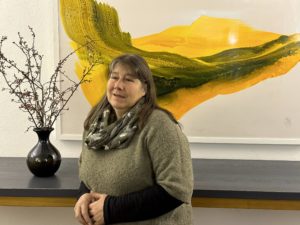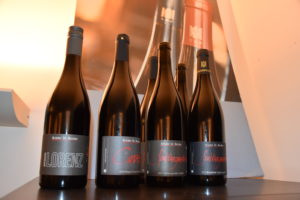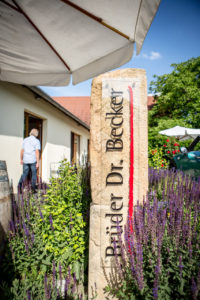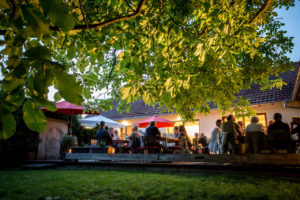Nowadays there is hardly a winery that does not use the term “sustainability” in its presentation: Sustainability in the vineyard, in the development of the wines in the cellar, in the energy supply of the winery buildings, and in shipping. At the beginning of the 80s, this was very different: Lotte Pfeffer was studying viticulture and oenology at the renowned Geisenheim University at the time.

Lotte Pfeffer-Müller from Dr. Becker Brothers Winery. Credit: Wolfgang Junglas
Organic wine used to be ridiculed
“Organic viticulture was not taught back then. The subject of organic wine was actually laughed at!”, she remembers. Her parents began organic viticulture in 1978. The Dr. Becker Brothers Winery is the first certified organic winery in VDP – the Association of German Prädikat Wine Estates. At that time, it was still said: “Organic wine doesn’t have customers, it has sympathisers!” Today the topic of organic wine is no longer laughed at. On the contrary – it has reached the centre of society and now meets the customer’s taste.
Fungus-resistant grape varieties for the future

Organic wine from Dr. Becker Brothers Winery. credit: Wolfgang Junglas
Lotte Pfeffer-Müller and her husband, Hans Müller, still focus on organic innovation: In addition to the classic grape varieties Riesling, Silvaner Scheurebe, Müller-Thurgau and Pinot Noir, they grow fungus-resistant grape varieties, such as Regent and Souvignier gris. “On the high ground and in the windy terraces, the conditions for classic varieties are acceptable. But on the Rhine plain we need the Piwi varieties,” Lotte Pfeffer-Müller explains.
None of the vineyards is more than two kilometres away from the winery. Short distances are also part of sustainability. So are the solar panels on the roof, the swallows’ nests on the wall, the eco-balance of the labels and the weight of the glass bottles: “I want to have the lightest bottle available: not 600 grams – more like 380 grams!”, exclaims this passionate winemaker’s wish.

The entrance offers a warm welcome. Credit: Wolfgang Junglas
Sustainability as an ongoing process
In this winery, all details are carefully scrutinised; sustainability is an ongoing process. The development of the wines is also constantly evolving. And exciting natural wines in the new PURE style are the current trend. The wines are completely fermented and bottled unfiltered. Scheurebe, Riesling and Pinot Noir “pure” – unusual, intense taste experiences are offered at the tasting. The same applies to the “orange” wines, Silvaner and Souvignier gris: The white wine grapes are fermented on the mash like red wine and thus develop an intense colour and taste experience. The winery’s experimental wines are very popular, for example in Berlin restaurants.
What does spring taste like?
During the guided walks through the vineyards of Rheinhessen, Hans Müller explains to wine tourists what sustainability means and how it feels: “This is what spring tastes like, this is what it looks like!”, he demonstrates to his guests, outside in the middle of nature.

Terrace and idyllic garden in Weingut-Brueder-Becker. Credit: Wolfgang Junglas
What is growing between the vines right now? If you do without sprays, what does the mechanical “understock cultivation” look like? For all of this, organic farms must work in line with the market – a task that is not always easy. Nevertheless, when you sit under the walnut tree with Lotte Pfeffer-Müller and Hans Müller during a large estate wine tasting, with a glass of wine in your hand, you can taste that sustainability always pays off in terms of taste.
The prize for the Great Wine Capitals Best of Wine Tourism Award 2023 in the category “Sustainability in Wine Tourism” goes to the “Weingut Brüder Dr. Becker, Ludwigshöhe”.
The many decades of commitment to organic viticulture and its consistent implementation, convinced the jury completely.
More information
To learn more about “Weingut Brüder Dr. Becker, Ludwigshöhe” visit the website.
About the blogger:
TV- and wine journalist Wolfgang Junglas is responsible for tv broadcasts such as “The Election of the German Wine Queen” in the entertainment editorial department at SWR Television in Mainz. He is also a writer, president of Weinfeder e. V., president of FIJEV and lecturer at Geisenheim University, Geisenheim.
Learn more about Rheinhessen and its wine capital Mainz on their page: Mainz | Rheinhessen